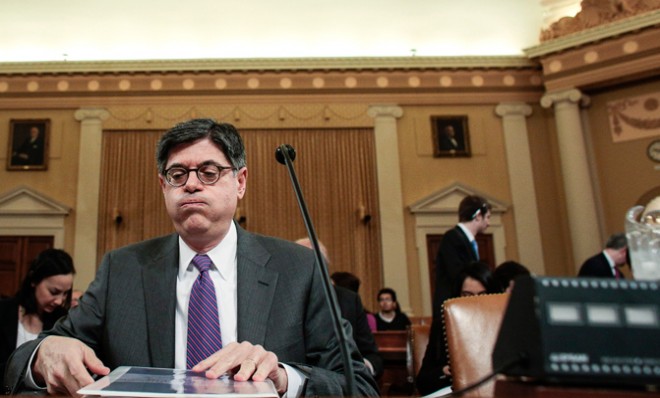How the looming debt ceiling fight could screw up the U.S. economy
Yup, this is happening — again

A free daily email with the biggest news stories of the day – and the best features from TheWeek.com
You are now subscribed
Your newsletter sign-up was successful
Ready for more debt-ceiling drama?
The Treasury Department said Monday it would hit its borrowing limit in mid-October, which means that Congress will need to raise its $16.7 trillion debt ceiling to pay the nation's bills.
The sooner-than-expected deadline comes at an inconvenient moment, because Congress is already facing a budget deadline for the stopgap "continuing resolution" that finances the federal government, which is set to run out September 30. Failure to come to an agreement would trigger a government shutdown.
The Week
Escape your echo chamber. Get the facts behind the news, plus analysis from multiple perspectives.

Sign up for The Week's Free Newsletters
From our morning news briefing to a weekly Good News Newsletter, get the best of The Week delivered directly to your inbox.
From our morning news briefing to a weekly Good News Newsletter, get the best of The Week delivered directly to your inbox.
Having two big deadlines fall two weeks apart could be a recipe for disaster. Republicans, led by Speaker John Boehner (R-Ohio), have been musing about the possibility of using the debt ceiling, instead of a government shutdown, as leverage to delay the implementation of ObamaCare.
But as Ezra Klein put it in The Washington Post, "Trading a government shutdown for a debt-ceiling breach is like trading the flu for septic shock":
Anything Republicans might fear about a government shutdown is far more terrifying amidst a debt-ceiling breach. The former is an inconvenience. The latter is a global financial crisis. It’s the difference between what happened in 1995, when the government did shutdown, and what happened in 2008, when global markets realized a bedrock investment they thought was safe (housing in that case, U.S. treasuries in this one) was full of risk. [The Washington Post]
Indeed, a debt ceiling debate in 2011 that went on to the last possible minute had real economic consequences, leading Standard & Poor's to downgrade the United States' credit rating. The move "left a clear and deep dent in US economic and market data," said Matt Phillips at Quartz.
Investors pulled huge amounts of cash from the stock market, and consumer confidence was hurt as well. When the same problem cropped up again in May 2012, because Congress failed to reach a long-term deal, Betsey Stevenson and Justin Wolfers in Bloomberg explained how confidence plummeted the first time around:
A free daily email with the biggest news stories of the day – and the best features from TheWeek.com
[Confidence] went into freefall as the political stalemate worsened through July. Over the entire episode, confidence declined more than it did following the collapse of Lehman Brothers Holdings Inc. in 2008. After July 31, when the deal to break the impasse was announced, consumer confidence stabilized and began a long, slow climb that brought it back to its starting point almost a year later. [Bloomberg]
This morning, Wolfers had this to say:
Treasury Secretary Jack Lew visited CNBC Tuesday morning to reiterate President Obama's promise not to go down he same road. "The president has made it clear: We're not going to negotiate over the debt limit," Lew said.
He also explained why in a letter to Boehner Monday morning. "Protecting the full faith and credit of the United States is the responsibility of Congress, because only Congress can extend the nation's borrowing authority," he wrote. "Failure to meet that responsibility would cause irreparable harm to the American economy."
But Boehner is facing intense pressure from the right wing of his caucus to extract concessions from Obama before raising the debt limit, concessions that many view as extreme. With his speakership on the line, Boehner says he has no intention of backing down, responding, "I’ve made it clear that we’re not going to increase the debt limit without cuts and reforms that are greater than the increase in the debt limit."
“The president doesn’t think this is fair, thinks I’m being difficult to deal with," he said. "But I’ll say this: It may be unfair but what I’m trying to do here is to leverage the political process to produce more change than what it would produce if left to its own devices. We’re going to have a whale of a fight."
In other words, it looks like it's going to be an October to remember — and not in a good way.
Carmel Lobello is the business editor at TheWeek.com. Previously, she was an editor at DeathandTaxesMag.com.
-
 Why are election experts taking Trump’s midterm threats seriously?
Why are election experts taking Trump’s midterm threats seriously?IN THE SPOTLIGHT As the president muses about polling place deployments and a centralized electoral system aimed at one-party control, lawmakers are taking this administration at its word
-
 ‘Restaurateurs have become millionaires’
‘Restaurateurs have become millionaires’Instant Opinion Opinion, comment and editorials of the day
-
 Earth is rapidly approaching a ‘hothouse’ trajectory of warming
Earth is rapidly approaching a ‘hothouse’ trajectory of warmingThe explainer It may become impossible to fix